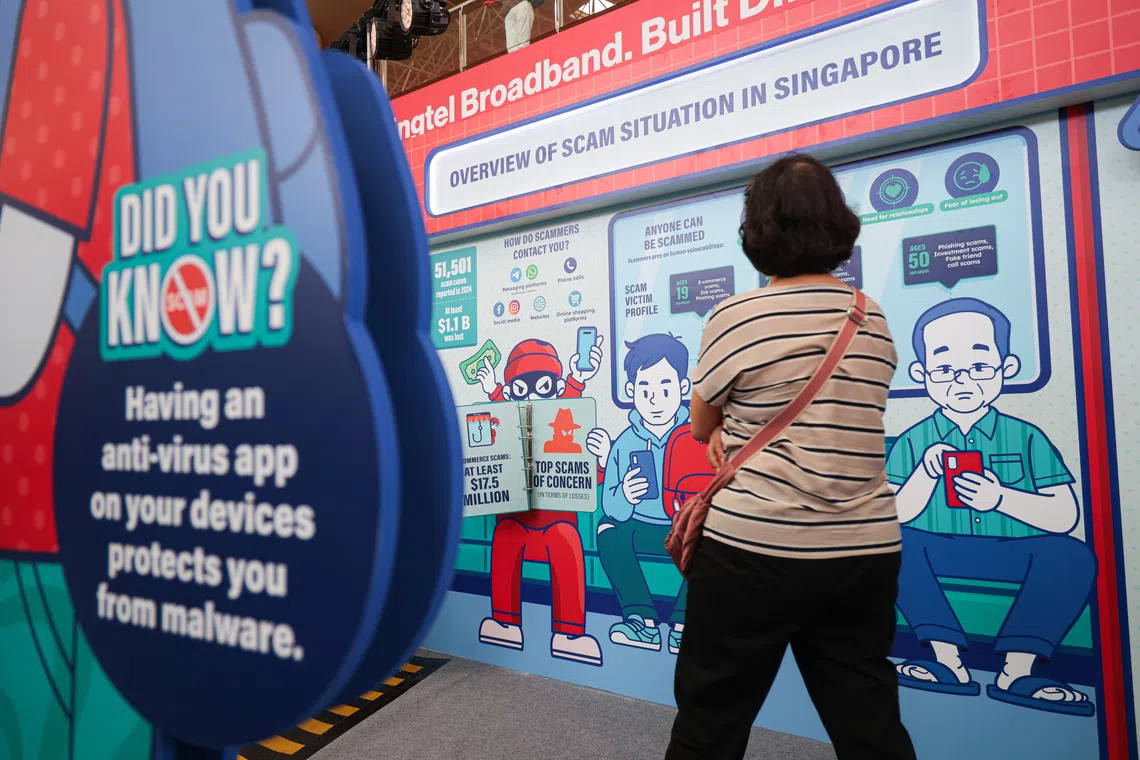In 80% of scams, victims were manipulated into sending money to scammers: Goh Pei Ming
Sign up now: Get ST's newsletters delivered to your inbox

Visitors at the launch of the inaugural National Anti-Scam Roadshow at Toa Payoh HDB Hub Atrium on Nov 8.
PHOTO: LIANHE ZAOBAO
Follow topic:
- Scams often succeed because victims transfer money themselves, highlighting the need for individual vigilance and scepticism.
- The National Anti-Scam Roadshow aims to educate the public with interactive exhibits and activities, promoting awareness and prevention.
- New laws impose caning for scammers and money mules, signalling the seriousness of tackling scams, following $450 million lost this year.
AI generated
SINGAPORE - Defence against scams starts with the individual, as anyone can fall prey to scams.
About four in five – or about 80 per cent – of scams are self-effected, meaning the money that victims lose is transferred by the victims themselves to the scammers.
Minister of State for Home Affairs Goh Pei Ming said this on Nov 8 at the launch of the inaugural National Anti-Scam Roadshow at Toa Payoh HDB Hub Atrium.
The roadshow, with the tagline “We Can ACT Against Scams”, is organised by the Ministry of Home Affairs and the Ministry of Digital Development and Information.
Being held on Nov 8 and 9 from 10am to 8pm, it features stage performances, interactive exhibits, games and educational activities.
Mr Goh said scammers use psychological tactics to deceive and manipulate victims, who end up transferring money into the scammer’s bank accounts.
He added: “This is why the Government has undertaken many public education efforts, such as the I Can Act Against Scams campaign. We hope to empower everyone to stay alert, to exercise healthy scepticism, especially when something looks too good to be true, to protect all of us.”

Minister of State for Home Affairs Goh Pei Ming said scammers use psychological tactics to deceive and manipulate victims, who end up transferring money into the scammer’s bank accounts.
PHOTO: LIANHE ZAOBAO
Some highlights of the roadshow include the Red Flag Railway, which consists of interactive panels about the scam situation in Singapore, and the Scammers Den, an immersive theatre experience that allows visitors to step into the shoes of a scam victim.
To engage visitors, booths have been set up by the Monetary Authority of Singapore, GovTech Singapore, the National Crime Prevention Council, the Infocomm Media Development Authority and Google, among others.

The inaugural National Anti-Scam Roadshow is organised by the Ministry of Home Affairs and the Ministry of Digital Development and Information.
PHOTO: LIANHE ZAOBAO
Noting that more than $450 million was lost to scams in the first half of 2025, Mr Goh said the Government has rolled out many anti-scam measures.
On Nov 4, a new law was passed in Parliament
This is to target syndicate members and recruiters, as well as those who help them, such as money mules who provide their bank accounts, SIM cards or Singpass credentials.
Money mules will face discretionary caning of up to 12 strokes.
Mr Goh said: “We have typically reserved caning for only the most serious of crimes. Therefore, by imposing caning on (scammers), this shows how seriously we are taking the issue nationally. We will not let scammers or mules continue what they have been doing. We will not tolerate this.”
Other measures to tackle scams include working with online platforms to protect users through the introduction of codes of practice under the Online Criminal Harms Act. This requires designated service providers to implement measures on their platforms to protect users.
Between 2020 and the first nine months of 2025, there were about 190,000 scam cases reported, with losses amounting to at least $3.88 billion.
Mid-year scam statistics from the police showed that the most common ruses were phishing scams



